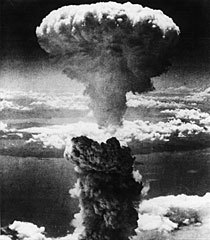Kenneth C. Davis's Blog, page 2
September 30, 2025
Who Said It? 10/28/2021
President Dwight D. Eisenhower (June 14, 1953)

President Eisenhower (Courtesy: Eisenhower Presidential Library and Museum)
In 1953, Senator Joseph McCarthy, with assistance from FBI Director J. Edgar Hoover, campaigned to suppress books hinting at any connection to Socialism or Communism.
In April 1953, two of McCarthy’s underlings, Roy Cohn and David Schine, were dispatched to Europe, partly to scour U.S. Information Service libraries. Created to provide war-ravaged countries with American books, these collections – McCarthy claimed – held thousands of works by Communists. Intimidated by McCarthy’s men, foreign service officials removed titles by, among others, the blacklisted writers Dashiell Hammett, Lillian Hellman, and Howard Fast.
Reluctant to challenge the powerful Senator, Eisenhower offered these words to a commencement audience at Dartmouth:
Look at your country. Here is a country of which we are proud, as you are proud of Dartmouth and all about you, and the families to which you belong. But this country is a long way from perfection–a long way. We have the disgrace of racial discrimination, or we have prejudice against people because of their religion. We have crime on the docks. We have not had the courage to uproot these things, although we know they are wrong. And we with our standards, the standards given us at places like Dartmouth, we know they are wrong.
Now, that courage is not going to be satisfied–your sense of satisfaction is not going to be satisfied, if you haven’t the courage to look at these things and do your best to help correct them, because that is the contribution you shall make to this beloved country in your time. Each of us, as he passes along, should strive to add something.
It is not enough merely to say I love America, and to salute the flag and take off your hat as it goes by, and to help sing the Star Spangled Banner. Wonderful! We love to do them, and our hearts swell with pride, because those who went before you worked to give to us today, standing here, this pride.
And this is a pride in an institution that we think has brought great happiness, and we know has brought great contentment and freedom of soul to many people. But it is not yet done. You must add to it.
Don’t join the book burners. Don’t think you are going to conceal faults by concealing evidence that they ever existed. Don’t be afraid to go in your library and read every book, as long as that document does not offend our own ideas of decency. That should be the only censorship.
“Remarks at the Dartmouth College Commencement Exercises”
Source and complete text: Dwight D. Eisenhower, Remarks at the Dartmouth College Commencement Exercises, Hanover, New Hampshire. Online by Gerhard Peters and John T. Woolley, The American Presidency Project
It is also worth noting that Eisenhower’s words did not translate into much action. U.S. Information Services libraries were stripped of thousands of titles. Read my post When Robin Hood Was Blacklisted
The post Who Said It? 10/28/2021 first appeared on Don't Know Much.
September 2, 2025
Who Said It?
“A great nation does not hide its history. It faces its flaws and corrects them. This museum tells the truth that a country founded on the promise of liberty held millions in chains. That the price of our union was America’s original sin.”
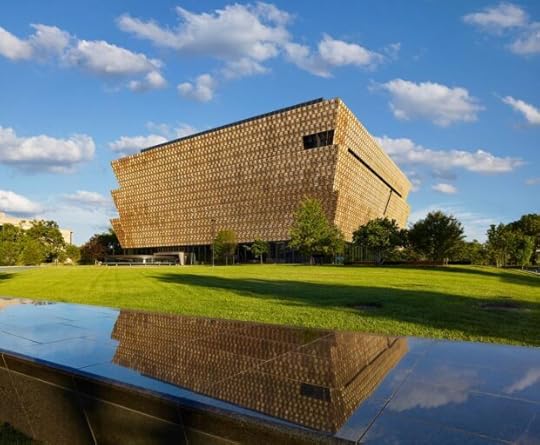
The National Museum of African African American History and Culture https://www.si.edu/newsdesk/factsheet...
–Former President George W. Bush, September 2016 speech at the opening ceremony of the National Museum of African American History and Culture/Smithsonian.
The post Who Said It? first appeared on Don't Know Much.
September 1, 2025
The World in Books: A Year of Reading–Wisely
COMING IN PAPERBACK: OCTOBER 2025
THE WORLD IN BOOKS: A YEAR OF READING–WISELY
Named to “The Most Anticipated: The Great Fall 2024 Preview” by The Millions
“Kenneth C. Davis’s The World in Books is a testament to both the beauty and power of the written word. And also, a very smart guide to books that have changed the way we think – and sometimes even changed us.”
–Deborah Blum, Pulitzer-Prize winning author of The Poison Squad and the bestseller, The Poisoner’s Handbook.
First Trade review from Kirkus Reviews
“A wealth of succinct, entertaining advice.” Full review
Now out from Scribner Books and Simon & Schuster Audio and available in paperback on October 21, 2025
Read more and order copies here.
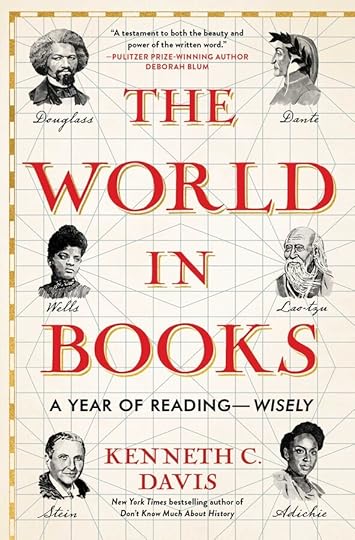
More Praise for The World in Books:
“In his accessible, well-written, and unanticipatedly humorous The World in Books, Kenneth C. Davis takes readers on a journey that highlights fifty-two short yet provocative works of non-fiction. Highlighting both traditional favorites and contemporary classics, Davis offers his sharp insights in ways that appeal to the inquisitive mind, regardless of its familiarity with the selected texts. His poignant “Introduction” sets the stage for the contemporary relevance of why books like these matter in contemporary times, which makes this collection all the more relevant. Highly recommended for every person who treasures the freedom to read and values the transformative power it has for us all.”
—Dr. J. Michael Butler, Kenan Distinguished Professor of History, Flagler College and author of Beyond Integration
What a “Year of Reading–Wisely” looks like….
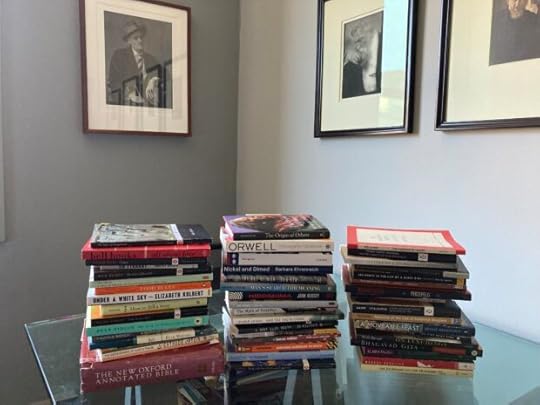
Photo credit Kenneth C. Davis
Among the 52 titles I have included are The Epic of Gilgamesh, Genesis, the poetry of Sappho, Meditations by Marcus Aurelius, and such profoundly influential writers as Frederick Douglass, Henry David Thoreau, Virginia Woolf, Helen Keller, James Baldwin, Susan Sontag, and Timothy Snyder.
The essential message of this book is that books matter–now more than ever. We must continue to educate ourselves. I believe that Open Books Open Minds.
I look forward to talking about this book in the coming months and sharing my fundamental belief that books can change us and the world.
In the meantime, please read and enjoy Great Short Books: A Year of Reading–Briefly
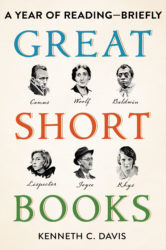
The post The World in Books: A Year of Reading–Wisely first appeared on Don't Know Much.
August 18, 2025
Who Said It? (Labor Day edition)
(Reposted from 2014)
Capital is only the fruit of labor, and could never have existed if labor had not first existed. Labor is the superior of capital, and deserves much the higher consideration.

Abraham Lincoln (November 1863) Photo by Alexander Gardner
Abraham Lincoln, “First Annual Message to Congress” (“State of the Union”) December 3, 1861
It is not needed nor fitting here that a general argument should be made in favor of popular institutions, but there is one point, with its connections, not so hackneyed as most others, to which I ask a brief attention. It is the effort to place capital on an equal footing with, if not above, labor in the structure of government. It is assumed that labor is available only in connection with capital; that nobody labors unless somebody else, owning capital, somehow by the use of it induces him to labor. This assumed, it is next considered whether it is best that capital shall hire laborers, and thus induce them to work by their own consent, or buy them and drive them to it without their consent. Having proceeded so far, it is naturally concluded that all laborers are either hired laborers or what we call slaves. And further, it is assumed that whoever is once a hired laborer is fixed in that condition for life.
Now there is no such relation between capital and labor as assumed, nor is there any such thing as a free man being fixed for life in the condition of a hired laborer. Both these assumptions are false, and all inferences from them are groundless.
Labor is prior to and independent of capital. Capital is only the fruit of labor, and could never have existed if labor had not first existed. Labor is the superior of capital, and deserves much the higher consideration. Capital has its rights, which are as worthy of protection as any other rights.
Source and Complete text: Abraham Lincoln: “First Annual Message,” Read more about Lincoln, his life and administration and the Civil War in Don’t Know Much About® History, Don’t Know Much About® the Civil Warand Don’t Know Much About® the American Presidents
Labor Day became a federal holiday on September 3, 1894.
Read about the history of Labor Day in this post.
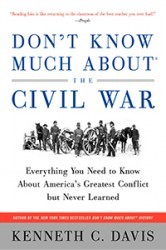
Don’t Know Much About the Civil War (Harper paperback, Random House Audio)
The post Who Said It? (Labor Day edition) first appeared on Don't Know Much.
Labor Day 2025
[Post updated August 18, 2025]
To most Americans, the first Monday in September means a three-day weekend and the last hurrah of summer– a final outing at the beach before school begins, a family picnic. The federal Labor Day holiday was signed into law by President Grover Cleveland during his second term in 1894.
Since then, organized American labor has seen its ups and downs. Under the administration of President Joe Biden, unions had enjoyed something of a comeback, winning some large victories. President Biden and Vice President Harris had joined the picket lines alongside auto workers–a presidential first. But the election of 2024 reshaped the landscape. A 2024 Labor Department blog celebrating the gains made by unions under President Biden has been removed. Among the victories it heralded:
The United Auto Workers notched two major victories– new contracts with the Big Three automobile manufacturers and an organizing win at the Chattanooga, Tennessee Volkswagen plantSeveral Hollywood entertainment unions representing actors, writers, production crews, musicians and other craftspeople reached new deals with the film and television industry that contained significant economic advances as well as protections for their members from the increasing use of artificial intelligenceLabor unions representing pilots and flight attendants delivered on their promises to their members by negotiating contracts that buoyed the economic security of airline industry workers.The International Brotherhood of Teamsters reached a new 5-year contract with Anheuser-Busch, boosting pay, benefits, and job security for about 5,000 union-represented employees.
In 2025, the Labor Day landscape is very different. The current administration is trying to roll back union protections for federal workers, as reported in the New York Times:
President Trump expanded his wide-reaching effort to strip union protections from federal employees on Thursday, signing an executive order that commanded roughly half a dozen government agencies to end their collective bargaining agreements with unions representing their employees. New York Times, August 29, 2025
While the national unemployment rate remains low, many working people are struggling with higher costs and an uncertain future. And Artificial Intelligence (AI) has emerged as a new threat to American jobs and careers.
“But now, the spread of A.I. programming tools, which can quickly generate thousands of lines of computer code — combined with layoffs at companies like Amazon, Intel, Meta and Microsoft — is dimming prospects in a field that tech leaders promoted for years as a golden career ticket. The turnabout is derailing the employment dreams of many new computing grads and sending them scrambling for other work.” –“Goodbye, $165,000 Tech Jobs,” New York Times (August 14, 2025)
But as we rethink work and life, it is a most fitting moment to consider how we labor and the history of Labor Day. The holiday was born at the end of the nineteenth century, in a time when work was no picnic. As America was moving from farms to factories in the Industrial Age, there was a long, violent, often-deadly struggle for fundamental workers’ rights, a struggle that in many ways was America’s “other civil war.” (For a complete history of Labor Day, read “The Blood and Sweat Behind Labor Day”)

“Glassworks. Midnight. Location: Indiana.” From a series of photographs of child labor at glass and bottle factories in the United States by Lewis W. Hine, for the National Child Labor Committee, New York. Library of Congress
The first American Labor Day is dated to a parade organized by unions in New York City on September 5, 1882, as a celebration of “the strength and spirit of the American worker.” Their goals were simple: decent wages, an eight-hour workday and the right to organize. Among, other things, these labor organizers and working people wanted an end to child labor.
In 1861, Lincoln told Congress:
“Labor is prior to and independent of capital. Capital is only the fruit of labor, and could never have existed if labor had not first existed. Labor is the superior of capital, and deserves much the higher consideration. Capital has its rights, which are as worthy of protection as any other rights. Nor is it denied that there is, and probably always will be, a relation between labor and capital producing mutual benefits. The error is in assuming that the whole labor of community exists within that relation.”
Today, in postindustrial America, Abraham Lincoln’s words ring empty. Labor is far from “superior to capital.” Working people and unions have borne the brunt of the great changes in the globalized and increasingly computerized economy.
But the facts are clear: In the current economic life of America, the loss of union jobs and the resistance to workers organizing is one key reason for the decline of America’s middle class.
The post Labor Day 2025 first appeared on Don't Know Much.
July 11, 2025
Who Said It (7-17-2022)
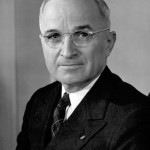
President Harry S. Truman
(Photo: Truman Library)
President Harry S. Truman (Diary Entry July 17, 1945)
“Promptly a few minutes before twelve I looked up from the desk and there stood Stalin in the doorway. I got to my feet and advanced to meet him. He put out his hand and smiled. I did the same. . . . After the usual polite remarks we got down to business. I told Stalin that I am no diplomat but usually said yes or no to questions after hearing all the argument. It pleased him. I asked him if he had the agenda for the meeting. He said he had and that he had some more questions to present. I told him to fire away. He did and it is dynamite—but I have some dynamite too which I’m not exploding now. . . . I can deal with Stalin. He is honest—but smart as hell.”
(Source: The National Archives)
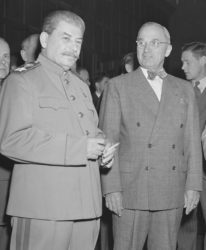
Stalin and Truman
Source: National Archives, Records of the Office of the Chief Signal Officer [111-SC-209221-S]
The meeting between Truman and Stalin took place in a suburb of the devastated city of Berlin just before the opening of the Potsdam Conference. Truman, Stalin, and Great Britain’s Prime Minister Winston Churchill, leaders of the three largest Allied nations, were gathered there to discuss the political future of Europe and the conduct of the war still raging in the Pacific.” (Eyewitness: The National Archives)
The day before this meeting, the atomic bomb had been successfully tested in New Mexico. A week later, on July 24, Truman informed Stalin of a “new weapon of unusual destructive force.” Through his network of spies, Stalin already knew about the atomic bomb.
Read my post, “The Month That Changed the World,” a complete account of events in the final days of World War II.
I discuss Truman’s presidency in greater detail in Don’t Know Much About the American Presidents and the post-World War II beginnings of the Cold War in Don’t Know Much About History and The Hidden History of America at War. For more about Stalin read Strongman: The Rise of Five Dictators and the Fall of Democracy.

Now In paperback THE HIDDEN HISTORY OF AMERICA AT WAR: Untold Tales from Yorktown to Fallujah
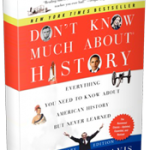
Don’t Know Much About History (Revised, Expanded and Updated Edition)
The post Who Said It (7-17-2022) first appeared on Don't Know Much.
The Month That Changed The World: July 16-August 15, 1945
[Originally posted in 2020 to mark the 75th Anniversary of the end of World War II; Revised July 11, 2025]
As the world approaches the 80th anniversary of the dropping of the atomic bombs in August 1945, this post offers a day-by-day timeline of the momentous events that led to the end of the war and the transformation of the modern world.
From the “Trinity” Test to Hiroshima, Nagasaki, and Japan’s Surrender:
The Month That Changed the World

The atomic bomb cloud over Hiroshima Source: National Archives https://catalog.archives.gov/id/542192
On August 6, 1945, the New York Times asked:
“What is this terrible new weapon?”
(New York Times, August 6, 1945: “First Atomic Bomb Dropped on Japan”)
The story followed the announcement made that day by President Harry S. Truman:
“SIXTEEN HOURS AGO an American airplane dropped one bomb on Hiroshima, an important Japanese Army base. That bomb had more power than 20,000 tons of T.N.T. It had more than two thousand times the blast power of the British ‘Grand Slam’ which is the largest bomb ever yet used in the history of warfare.”
August 6, 1945

President Harry S. Truman
(Photo: Truman Library)
(“Statement by the President Announcing the Use of the A-Bomb at Hiroshima”: Truman Library and Museum)
The use of the first atomic bomb followed the successful test detonation –the goal of the wartime Manhattan Project — and the beginning of a series of events that reshaped the world in the final weeks of World War II.
•July 16, 1945 the first atomic device, nicknamed “the Gadget,” is detonated in the “Trinity” test at Alamogordo, New Mexico. Read this account of the test in National Geographic.
New York Times reporter Dennis Overbye visited the site in 2021. His report “Touring Trinity, the Birthplace of Nuclear Dread”:
“The detonation created a crater eight feet deep, a half-mile wide and lined with glassy pebbles called trinitite: sand that had been swept up in the fireball, vaporized and then fell back down in molten radioactive droplets.
By many accounts, J. Robert Oppenheimer uttered a passage he recalled from the Hindu epic Bhagavad Gita:
“Now I am become death, destroyer of worlds.”

The Trinity test, 15 seconds after detonation. Photo courtesy of David Wargowski Source: National Museum of Nuclear Science & History
Read more about the test in “The First Light of Trinity” by Alex Wellerstein in The New Yorker.
One of Robert Oppenheimer’s biographers, Kai Bird, has also written “Oppenheimer, Nullified and Vindicated,” also in The New Yorker.
UPDATE July 18, 2023“The Real History Behind Christopher Nolan’s ‘Oppenheimer'” (Smithsonian)
“Oppenheimer provides an opportunity to revisit this charismatic, contradictory man and reconsider how previous attempts to tell his story have succeeded—and failed—at fathoming one of the 20th century’s most fascinating public figures.”
UPDATE: July 20, 2023:
“Trinity Nuclear Test’s Fallout Reached 46 States, Canada, and Mexico, Study Finds”
“A new study, released on Thursday ahead of submission to a scientific journal for peer review, shows that the cloud and its fallout went farther than anyone in the Manhattan Project had imagined in 1945. Using state-of-the-art modeling software and recently uncovered historical weather data, the study’s authors say that radioactive fallout from the Trinity test reached 46 states, Canada and Mexico within 10 days of detonation.”
“Trinity Nuclear Test’s Fallout Reached 46 States, Canada, and Mexico, Study Finds,” New York Times (July 20, 2023)
Over the next weeks, the world would be transformed, with the arrival of the Atomic Age, Japan’s surrender, the end of World War II, the charter of the United Nations, and the beginning of the Cold War.
The development, testing, and use of atomic bombs is documented by the National Museum of Nuclear Science and History.
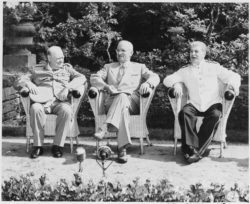
L to R: British Prime Minister Winston Churchill, President Harry S. Truman, and Soviet leader Josef Stalin in the garden of Cecilienhof Palace before meeting for the Potsdam Conference in Potsdam, Germany. National Archives Identifier 198958
•July 17 In Potsdam, near Berlin in defeated Germany, President Harry S. Truman comes face to face with the Soviet dictator Joseph Stalin. Truman had taken office upon the death of President Roosevelt on April 12, 1945 without knowledge of the Manhattan Project or the atomic bomb’s existence. Having been told about the potential weapon, Truman is informed of the successful “Trinity” test while meeting Soviet Strongman Stalin with British Prime Minister Winston Churchill at the European postwar conference.
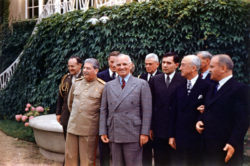
Harry S. Truman and Joseph Stalin at Potsdam (Public Domain: President Harry S. Truman Library and Museum)
“I told Stalin that I am no diplomat but usually said yes or no to questions after hearing all the argument.”
In his diary, Truman adds: “He said he had and that he had some more questions to present. I told him to fire away. He did and it is dynamite—but I have some dynamite too which I’m not exploding now. . . . I can deal with Stalin. He is honest—but smart as hell.” (National Archives)

Read about Stalin’s rise to power in Strongman
Following the New Mexico test success, the components of the atomic bomb are loaded onto the USS Indianapolis in San Francisco for transport to an airbase on Tinian Island in the Pacific. Many of the crew of nearly 1,200 men have no idea what the ship is carrying.
•July 19 In the United States, Congress approves the Bretton Woods agreement, an international pact designed to avoid postwar financial crises like those that followed World War I. The agreement creates the International Money Fund and what later becomes the World Bank.
The Japanese cities of Choshi, Hitachi, Fukui and Okazaki are struck by 600 B-29 Superfortress bombers dropping some 4,000 tons of bombs — the largest employment of the bomber to date.
The USS Indianapolis reaches Pearl Harbor in the first leg of its voyage to deliver the atomic bomb components.

https://catalog.archives.gov/id/515009
• July 21 “A senior US Army Air Force intelligence officer in the Pacific distributed a report declaring: ‘The entire population of Japan is a proper Military Target . . . THERE ARE NO CIVILIANS IN JAPAN.’” Richard B. Frank via World War II Museum.

Truman and Churchill at Potsdam
https://www.trumanlibrary.gov/photogr...
In Potsdam, Truman and Churchill privately agree to use the atomic bomb if Japan does not surrender. Read about Truman’s decision from the National Park Service Harry S. Truman National Historic Site.
•July 22 In what is described as the last surface battle of World War II, the U.S. Navy sinks Japanese supply ships in the “Battle of Sagami Bay” (“Tokyo Bay”). Naval bombardments of the Japanese mainland continue, along with B-29 bombing raids striking Japanese cities.
In China, the American Far East Air Force attacks Japanese troops, airfields, and shipping near Shanghai.
•July 23 In Potsdam, Secretary of War Henry Stimson receives atomic bomb target list. In order of choice they are: Hiroshima, Kokura, and Niigata. He also receives an estimate of atomic bomb availability: “Little Boy” should be ready for use on Aug. 6, second “Fat Man-type” by Aug. 24. There are plans for a total of seven bombs available by December.
•July 24 Truman informs Stalin of a “new weapon of unusual destructive force.”
“In which I tell Stalin we expect to drop the most powerful explosive ever made on the Japanese. He smiled and said he appreciated my telling him–but he did not know what I was talking about–the Atomic Bomb! HST”
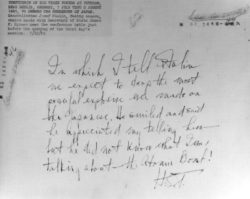
Truman’s note on back of photograph from Potsdam Conference describing his conversation with Stalin about the atomic bomb. Source: Truman Museum https://www.trumanlibrary.gov/photogr...

The Hidden History of America At War (paperback)
But Stalin already knows about the atomic bomb because of a network of spies inside the Manhattan Project. The Soviet push to capture Berlin in April and May 1945 was motivated in part by Stalin wanting to capture German scientists working on a Nazi atomic bomb and tons of uranium held in a Berlin lab. This episode is recounted in the “Berlin Stories” chapter of my book The Hidden History of America at War.
• July 25 Truman writes in his diary that he has made the decision to use “the most destructive bomb in the history of the world… I have told the Sec. of War, Mr. Stimson, to use it so that military objectives and soldiers and sailors are the target and not women and children.”
Sources: Truman Library and Museum National Security Archive, George Washington University
• July 26 British general election returns are announced; Prime Minister Winston Churchill is defeated and replaced by Clement Attlee.
“The landslide victory comes as a major shock to the Conservatives following Mr Churchill’s hugely successful term as Britain’s war-time coalition leader, during which he mobilised and inspired courage in an entire nation.” —BBC
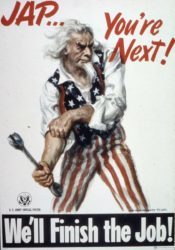
U.S. Propaganda poster (Source National Archives https://catalog.archives.gov/id/513563)
At the Potsdam Conference, the Potsdam Declaration demands an “Unconditional surrender” by Japan. Issued by Great Britain, China, and the U.S., it threatens:
“The alternative for Japan is prompt and utter destruction.”
The USS Indianapolis reaches Tinian that day.

USS Indianapolis 10 July 1945, after final overhaul and repair of combat damage. Photograph from the Bureau of Ships Collection in the U.S. National Archives (Naval History and Heritage Command https://usnhistory.navylive.dodlive.m...)
“Indianapolis departed San Francisco on 16 July 1945, foregoing her post-repair shakedown period. Touching at Pearl Harbor on 19 July, she raced on unescorted and reached Tinian on 26 July, covering some 5,000 miles from San Francisco in only ten days.”
After delivering the atomic bomb components, the ship departs for Guam and the Philippines.
• July 27 American B-29 SuperFortress bombers drop 600,000 leaflets over eleven Japanese cities warning that they are targets of bombings.
“But, unfortunately, bombs have no eyes. So, in accordance with America’s humanitarian policies, the American Air Force, which does not wish to injure innocent people, now gives you warning to evacuate the cities named and save your lives.” –from a “LeMay Leaflet,” named for General Curtis LeMay, architect of the Pacific bombing campaign. Image Courtesy Alex Wellerstein via Atomic Heritage Foundation)
In England, Winston Churchill has a final meeting with his joint chiefs of staff.
•July 28 In New York City, an Army B-25 bomber on a routine mission flies into the Empire State Building –then the world’s tallest skyscraper. Three crew members and eleven people in the building are killed.

“B-25 Mitchell bomber smashed beyond recognition into Empire State Building. This is a picture of the wreckage-strewn 79th floor where the bomber tore a 18-foot hole in wall. Propeller is embedded in the wall at the left.” Source: New York Daily News
“I was at the file cabinet and all of a sudden the building felt like it was just going to topple over,” [office worker Gloria] Pall said. “It threw me across the room, and I landed against the wall. People were screaming and looking at each other. We didn’t know what to do. We didn’t know if it was a bomb or what happened. It was terrifying.” Source: National Public Radio
In Potsdam, newly-elected Prime Minister Clement Attlee of the Labour Party arrives to rejoin the talks which are nearly concluded. Attlee led post-war UK until 1951.
“As Prime Minister, he enlarged and improved social services and the public sector in post-war Britain, creating the National Health Service and nationalising major industries and public utilities. Attlee’s government also presided over the decolonisation of India, Pakistan, Burma, Ceylon and Jordan, and saw the creation of the state of Israel upon Britain’s withdrawal from Palestine.” Official UK Biography of Attlee.
•July 29 The Japanese government rejects the Potsdam Declaration surrender demand.
Just after midnight, the Indianapolis is struck by a Japanese torpedo.
•July 30 Torpedoed by a Japanese submarine, the Indianapolis sinks in twelve minutes. Between 800 and 900 of the crew of nearly 1,200 are plunged into the shark-infested waters.
“What followed was an ordeal of hell on earth for those who survived the sinking. For a whole host of reasons, many related to the secrecy of her atom bomb mission, the rest of the Navy did not know that Indianapolis was missing.”
— Sam Cox (Rear Adm., USN, Ret.), “Lest We Forget: USS Indianapolis and her sailors” (inactive link)
–Read “The Sinking of the USS Indianapolis” via the National Archives including a film clip from the classic scene in Jaws in which Captain Quint describes the sinking of the ship and the shark attacks that followed.
•July 31 The assembly of the atomic bomb, code named “Little Boy,” is completed. The final arming of the bomb will be done in-flight.

In Potsdam, Truman is notified of the bomb being ready. He writes a message that concludes:
“Release when ready, but not sooner than August 2. HST”
According to the Truman Library:

The actual reply that President Truman wrote on July 31, 1945 (Photo taken by Dawn Wilson at the Harry S. Truman Presidential Library)
“No known written record exists in which Harry Truman explicitly ordered the use of atomic weapons against Japan. The closest thing to such a document is this handwritten order, addressed to Secretary of War Henry Stimson, in which Truman authorized the release of a public statement about the use of the bomb. It was written on July 31, 1945 while Truman was attending the Potsdam Conference in Germany. In effect, this served as final authorization for the employment of the atomic bomb, though the expression ‘release when ready’ refers to the public statement.”
•August 1 The atomic bomb is ready and flight orders are prepared. But weather delays the mission. Of four potential target cities, Hiroshima is chosen as the primary target.
In Potsdam that day, the Big Three wrap up their meetings and discuss plans for the trials of war criminals that later become known as the Nuremberg Trials.
Read my 2021 post on the Nuremberg Trials.
In the Pacific, hundreds of survivors from the Indianapolis desperately try to stay afloat in the shark-infested waters.
“In that clear water you could see the sharks circling. Then every now and then, like lightning, one would come straight up and take a sailor and take him straight down.” – Survivor of the Indianapolis sinking to the BBC.
•August 2
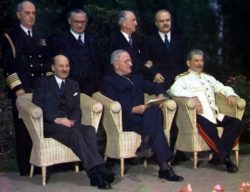
The Big Three at the end of the Potsdam Conference: Front row (Left to Right) Prime Minister Attlee, President Truman, Generalissimo Stalin. Source: Army Signal Corps Collection in the U.S. National Archives.
Shortly after midnight, the Potsdam Conference concludes with a joint communique. It includes reference to the United Nations, whose organization and charter had been completed on June 26 at a conference in San Francisco.
Truman speaks of a future Washington meeting with the Soviet leader, but he and Stalin never meet again.
What was clear was that the Conference had solidified the Soviet Union’s domination over much of Eastern Europe, including the eastern half of a divided Germany. Admiral William D. Leahy, Truman’s Chief of Staff, later wrote:
“The Soviet Union emerged at this time as the unquestioned all-powerful influence in Europe….”
The U.S. Navy is still unaware that the Indianapolis has gone down. More than 800 men went into the water and the survivors are spotted by a reconnaissance plane four days after the sinking.
“Marks’s crew dropped rubber rafts and supplies as they witnessed continuing shark attacks. Disregarding orders not to land at sea, the pilot touched down and began taxiing to pick up survivors.
As darkness set in, and as Marks waited for rescue vessels, he pulled men from the water into his aircraft. When the plane’s fuselage was at maximum capacity, survivors were tied to the wings with parachute cord. The pilot and his crew rescued a total of 56 men. Once signaled, a total of seven Navy ships converged on the site and rescued the remaining men. Only 317 sailors survived.” –National Archives, “The Sinking of the USS Indianapolis”

Indianapolis’ survivors en route to a hospital following their rescue, early August 1945. Source: Naval History and Heritage Command
“Looking for a scapegoat, the US Navy placed responsibility for the disaster on Captain McVay, who was among the few who managed to survive. For years he received hate mail, and in 1968 he took his own life. The surviving crew, including Cox, campaigned for decades to have their captain exonerated – which he was, more than 50 years after the sinking.” —“USS Indianapolis Sinking,” BBC
The commander of the Indianapolis, Charles B. McVay III, was the only World War II U.S. Navy captain to be court-martialed for the sinking of his ship. McVay died by suicide in 1968. In 2001, he was exonerated by an act of Congress.
•August 4 Colonel Paul Tibbets briefs the men of the 509th Composite Group -the weapon delivery arm of the Manhattan Project. Tibbets is the commander of the unit. His men do not know the nature of the bomb they will carry.
•August 5 The bombing mission is confirmed and Colonel Paul Tibbets announces he will pilot the plane which he names “Enola Gay,” after his mother.

Colonel Paul W. Tibbets, Jr., Pilot of the Enola Gay, the Plane that Dropped the Atomic Bomb August 6, 1945 (National Archives https://catalog.archives.gov/id/535737)
•August 6 At 0245 local time on Tinian,
“Enola Gay begins takeoff roll. [Pilot] Colonel Paul Tibbets says to co-pilot Robet Lewis, ‘Let’s go.’ He pushes all of the throttles forward. The overloaded Enola Gay lifts slowly into the night sky, using all of the more than two miles of runway.”
—Atomic Heritage Foundation, minute-by-minute timeline of Hiroshima and Nagasaki bombings.
0730:
“Tibbets announces to the crew: ‘We are carrying the world’s first atomic bomb.’ He pressurizes the Enola Gay and begins an ascent to 32,700 feet. The crew puts on their parachutes and flak suits.”
0912: Control of the Enola Gay is handed over to the bombardier, Thomas Ferebee, as the bomb run begins. A Radio Hiroshima operator reports that three planes have been spotted.
0914 (0814 Hiroshima time): Tibbets tells his crew, “On glasses.”
–Atomic Heritage Foundation Hiroshima and Nagasaki Bombing Timeline
8:15 AM (Hiroshima local time) The first atomic bomb is detonated over Hiroshima.
“In less than one second, the fireball had expanded to 900 feet. The blast wave shattered windows for a distance of ten miles and was felt as far away as 37 miles. Over two-thirds of Hiroshima’s buildings were demolished. The hundreds of fires, ignited by the thermal pulse, combined to produce a firestorm that had incinerated everything within about 4.4 miles of ground zero.”
Source: Hiroshima

The atomic bomb cloud over Hiroshima Source: National Archives https://catalog.archives.gov/id/542192
“In the street, the first thing he saw was a squad of soldiers who had been burrowing into the hillside opposite, making one of the thousands of dugouts in which the Japanese apparently intended to resist invasion, hill by hill, life for life; the soldiers were coming out of the hole, where they should have been safe, and blood was running from their heads, chests, and backs. They were silent and dazed.
Under what seemed to be a local dust cloud, the day grew darker and darker.”
–John Hersey, “Hiroshima,” New Yorker (August 24, 1946)
In Hiroshima, the estimated death toll reaches eighty thousand people killed instantly; as many as 90 percent of the city’s nurses and doctors also die instantly. By 1950, as many as 200,000 die as a result of long-term effects of radiation.
“Historians say General Groves understood the radiation issue as early as 1943 but kept it so compartmentalized that it was poorly known by top American officials, including Harry S. Truman. At the time he authorized the Hiroshima bombing, President Truman, scholars say, knew almost nothing of the bomb’s radiation effects.”
Read: “The Black Reporter Who Exposed a Lie about the Atomic Bomb” New York Times
In his official announcement, President Truman said,
It was to spare the Japanese people from utter destruction that the ultimatum of July 26 was issued at Potsdam. Their leaders promptly rejected that ultimatum. If they do not now accept our terms they may expect a rain of ruin from the air, the like of which has never been seen on this earth. Behind this air attack will follow sea and land forces in such numbers and power as they have not yet seen and with the fighting skill of which they are already well aware.

Aftermath of atomic bomb-November 1945 (Image: US Dept. of Energy”
Read Don’t Know Much About Hiroshima for more details about the bombing and its aftermath.
•August 7 A report to the Japanese Imperial Army General Staff reads:
“The whole city of Hiroshima was destroyed instantly by a single bomb.” (Atomic Heritage Foundation)
On Guam, the decision to use a second device is made and the mission date set for August 10, then moved to August 9 over weather concerns.

Fat Man being lowered and checked on transport dolly for airfield trip Image Source: Heritage Foundation https://www.atomicheritage.org/histor...
•August 8 Fulfilling a pledge Stalin had made earlier at the Yalta conference, the Soviet Union declares war on Japan and invades Manchuria the next day, sending more than one million troops into Japanese-held territory.
The Japanese military leadership was still divided over the surrender demand, with some leading generals vowing to fight to the death. A coup against Emperor Hirohito began to be planned by members of the Japanese military.
A plutonium bomb code named “Fat Man” is prepared on Tinian. It will be carried by a B-29 called “Bockscar.” The primary target is the city of Kokura, home to a large munitions plant.

The crew of the B-29 called “Bockscar” taken after the Nagasaki bombing (Image: U.S. Air Force)
•August 9
0347: Bockscar, piloted by Major Charles Sweeney, lifts off from Tinian Island. The target of choice is Kokura Arsenal.
Clouds and smoke from nearby fires obscure Kokura, so “Fat Man” is dropped over the secondary target, the city of Nagasaki, with a population estimated at 263,000, a city that was home to two Mitsubishi military plants. It is also the site of a prisoner of war camp.
“Nagasaki was a city on the west coast of Kyushu on picturesque Nagasaki Bay. It was famous as the setting for Puccini’s beautiful opera Madame Butterfly. It was also home to two huge Mitsubishi war plants on the Urakami River. This complex was the primary target, but because the city was built in hilly, almost mountainous terrain, it was a much more difficult target than Hiroshima…
Fat Man exploded at 1,840 feet above Nagasaki and approximately 500 feet south of the Mitsubishi Steel and Armament Works with an estimated force of 22,000 tons of TNT.
Unlike Hiroshima, there was no firestorm at Nagasaki. Despite this, the blast was more destructive to the immediate area, due to the topography and the greater power of Fat Man.”
—Hiroshima & Nagasaki Remembered
The death toll in Nagasaki also reaches 80,000 by the end of 1945. Read a full account of this mission in “Nagasaki: The Last Bomb” by Alex Wellerstein (New Yorker, August 7, 2015)
The National Archives “Unwritten Record” blog also offers resources on the atomic bombings.
Read this piece from Scientific America (August 6, 2023) about the American plan to study the effects of the atomic bombs
“On November 26, 1946, President Harry Truman authorized the National Academy of Sciences/National Research Council to establish the Atomic Bomb Casualty Commission (ABCC) ‘to undertake long range, continuing study of the biological and medical effects of the atomic bomb on man.'”– “Hiroshima’s Anniversary Marks An Injustice Done to Blast Survivors.“
•August 10 After Nagasaki is bombed, Truman orders no more strikes without his authorization. Another plutonium core for a third weapon is prepared for shipment.

September 24, 1945, 6 weeks after Nagasaki was destroyed by the world’s second atomic bomb attack. Photo by Cpl. Lynn P. Walker, Jr. (USMC) National Archives FILE #: 127-N-136176
Although an unofficial surrender message was sent by a Japanese news agency, the Japanese cabinet was divided and no decision was made. The Emperor would not surrender his sovereignty.
•August 11 The U.S. Secretary of State James Byrnes rejects any conditional surrender and states that the Emperor and Japan’s government will be subject to the Allied Powers and declares that any future Japanese government must reflect the will of the people.
Soviet troops invade South Sakhalin island, Japanese-held territory.
•August 12-13 Soviet troops advance into the Korean peninsula.
Emperor Hirohito agrees to accept the terms of Secretary Byrnes’s note and orders the suspension of military activity. He records a surrender announcement. Military officers began to plot against Hirohito in a coup known as the “Kyujo incident.”
•August 13 The bombing of Japan, including firebombing, resumes with more than 1,000 B-29s taking part.

Residential section of Tokyo after the March 1945 air raids. (Wikimedia commons http://www.kmine.sakura.ne.jp/kusyu/k...
Japanese officers continue to seek allies in their planned coup against the Imperial government.
•August 14 (August 15 in Japan): The military coup fails and several plotters commit suicide.
In an extraordinary address recorded earlier, the Emperor of Japan is heard on the radio for the first time and accepts the provisions of the Potsdam Declaration, agreeing to the unconditional surrender.
Read: “The Emperor’s Speech” by Max Fisher (The Atlantic, August 15, 2012)
At a White House conference, according to United Press International, Truman says:
“This is the day when Fascist and police governments cease to exist in the world. This is the day for democracy.”
-Source: “Japan Surrenders Unconditionally, World At Peace” UPI archives
“Japan surrendered unconditionally tonight, bringing peace to the world after the bloodiest conflict mankind has known.” (UPI Archives)
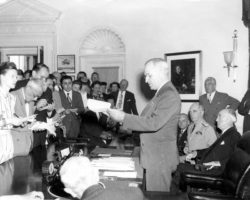
Truman announces Japan’s surrender to reporters in Oval Office.
Credit: Rowe, Abbie National Park Service Harry S. Truman Library & Museum.
Across America and England, jubilant crowds fill the streets once more for an unofficial V-J (Victory over Japan) Day, as they had three months earlier on VE Day, May 8,1945, after Germany’s surrender ended the war in Europe.
A video clip of Truman’s August 14 announcement from C-Span.

V-J Day Times Square August 14, 1945 Library of Congress Prints and Photographs Division. New York World-Telegram and the Sun Newspaper Photograph Collection. http://hdl.loc.gov/loc.pnp/cph.3c19650
•September 2, 1945 A formal surrender ceremony is performed in Tokyo Bay and that date is also referred to as V-J Day.

Formal surrender aboard USS Missouri Sept. 2. 1945 https://www.history.navy.mil/our-coll...
Almost since the day the first atomic bomb was dropped on Hiroshima, critics have second-guessed Truman’s decision and motives. A generation of historians and commentators have defended or repudiated the need for unleashing the atomic weapon. Admiral William D. Leahy, who was with Truman at Potsdam, later wrote in a memoir:
Once it had been tested, President Truman faced the decision as to whether to use it. He did not like the idea, but he was persuaded that it would shorten the war against Japan and save American lives. It is my opinion that the use of this barbarous weapon at Hiroshima and Nagasaki was of no material assistance in our war against Japan.
–William D. Leahy, I Was There (1950)
On the same day, in colonial French Indochina, Ho Chi Minh –who had been supported by the American OSS in its fight against Japan– declared Vietnam’s independence from France. On the occasion, Ho Chi Minh cited Thomas Jefferson:
All men are created equal. They are endowed by their Creator with certain inalienable rights, among them are Life, Liberty, and the pursuit of Happiness.
-Source: Council on Foreign Relations
In China, however, the Japanese surrender ended the wartime alliance between the Communists and Nationalists. The Chinese civil war began anew, with the US supporting Chiang Kai-shek’s Nationalists and Stalin’s USSR backing Mao Zedong’s Communists.
Read about Mao’s rise to power in Strongman: The Rise of Five Dictators and the Fall of Democracy.
Many historians contend that preventing death and casualties in an invasion of Japan was only a partial explanation for the use of the two atomic bombs. The United States was already wary of Stalin and his designs on Japan’s wartime territory. They argue that the use of the two devices was meant to end the war quickly to prevent Stalin from capturing territory held by Japan. It may have also been a signal to Stalin and the Soviet Union that the United States possessed these weapons and was willing to use them.
In other words, the dropping of the atomic bombs became the first volley in the Cold War.
READ about the debate in this Smithsonian article.
In 1952, Albert Einstein –whose 1939 letter to Franklin D. Roosevelt had set the Manhattan Project in motion — wrote a brief essay published by a Japanese magazine Kaizo in which he stated:
I was well aware of the dreadful danger for all mankind, if these experiments would succeed. But the probability that the Germans might work on that very problem with good chance of success prompted me to take that step. I did not see any other way out, although I always was a convinced pacifist. To kill in war time, it seems to me, is in no ways better than common murder.
He concluded:
Gandhi, the greatest political genius of our time has shown the way, and has demonstrated the sacrifices man is willing to bring if only he has found the right way. His work for the liberation of India is a living example that man’s will, sustained by an indomitable conviction is stronger than apparently invincible material power.
–Source Hiroshima & Nagasaki Remembered
You can read more about Hiroshima and the dropping of the atomic bombs in Don’t Know Much About History and more about President Truman in Don’t Know Much About the American Presidents and in The Hidden History of America At War. Read more about Mussolini, Hitler, and Stalin in STRONGMAN published on October 6, 2020.
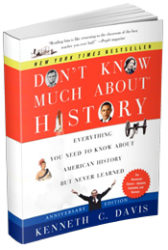


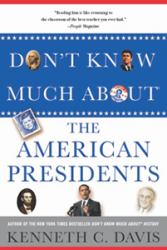
The post The Month That Changed The World: July 16-August 15, 1945 first appeared on Don't Know Much.
July 1, 2025
Don’t Know Much About® Thomas Jefferson
(Original post of 2011; revised July 1, 2025)
As we near America’s 250th birthday, the question of which American history we tell has rarely been so fraught. For more than 30 years, I have set out to provide an accurate and honest accounting of the nation’s past. This is not “revisionism,” but an attempt to get past the myths and misconceptions taught for so long. Many historians have done similar work during the past few decades. But now there is a concerted effort to go back to a so-called “patriotic” history. This notion scrubs much of the honest, documented work that has been accomplished by many scholars and teachers. It is a dangerous moment as it seeks to erase the uncomfortable pieces of American history. We need a history that honestly examines the contradictions between America’s ideals and actions.
Among America’s iconic Founding Fathers, there is no more complicated and contradictory figure than Thomas Jefferson.
Scientist, humanist, Enlightenment thinker, writer, architect, politician. He was all these things. The confusion over this genius comes from one basic question: How could the man who wrote, “All Men are Created Equal” and “Life, Liberty and the Pursuit of Happiness” go home to a Monticello plantation, completely dependent upon enslaved labor?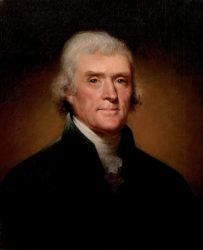
Even Jefferson’s birthday is confusing. History books say he was born on April 13,1743. But the grave marker at Monticello says he was born on April 2. That one is easier to answer than some of the larger contradictions in Jefferson’s life. Jefferson was born while the old Julian calendar was still in use in Protestant England and its American colonies. So the April 2 date is called “Old Style” (O.S.). When Great Britain and America finally came around and adopted the Gregorian (named for Pope Gregory) Calendar in 1758, Jefferson’s birth date was changed to April 13.
Birth date aside, Thomas Jefferson more than anyone embodies the “Great Contradiction” in American history. How could a nation dedicated to ideals of freedom and liberty continue a system that enslaved human beings in the cruelest of ways?
That contradiction is nowhere more evident than in Jefferson’s original draft of Declaration of Independence.
A few years ago, at the New York Public Library, I had the thrill of seeing Jefferson’s handwritten copy of his original draft of the Declaration of Independence. We may take the words for granted now. But Jefferson gave full voice to the idea that we all possess “inalienable rights.” That we are “created equal.” That we have basic rights to “life, liberty and the pursuit of happiness.” That governments exist to advance those human rights, and only with the “consent of the governed.”

“Fair Copy” of The Declaration of Independence (Source: New York Public Library)
This document was written on both sides of two pieces of paper. In his careful, flowing script, Jefferson included all of his original wording to show what the Congress in Philadelphia had changed, underscoring words and phrases that had been deleted. Those alterations, Jefferson, thought were “mutilations.” Distressed by the editing, he made these “fair copies” of his original some time after July 4th.
The most startling of these changes is a paragraph about what Jefferson calls “this execrable commerce” — slavery. Jefferson charged that King George III was responsible for the slave trade and was preventing American efforts to restrain that trade. The section was deleted completely. But it is striking to see Jefferson’s bold, block lettering when he describes:
an open market where MEN should be bought & sold
He clearly wanted to underscore his belief that enslaved people were “MEN.”
The contradiction is troubling and difficult to resolve. Jefferson knew slavery was wrong. He believed, like fellow slaveholder George Washington, that it would end. But both were inextricably tied to a society and economy, built on enslavement, even though they believed that the “peculiar institution” would gradually die out.
Of course, part of the cynicism in Jefferson’s case is due to the relationship between Jefferson and an enslaved woman Sally Hemings. Monticello now acknowledges that relationship existed, a contention first raised publicly in 1802 by muckraking newspaperman James Callender. In recent years, Monticello has also gone a long way in addressing the question of enslaved life at the plantation.
Jefferson, who died on July 4, 1826 –the 50th anniversary of the adoption of the Declaration– and his deep contradictions are the perfect reminder that politicians are people –even the marble gods like Washington and Jefferson. Their all-too human flaws are proof of that as well as the fact that history books once tried to hide these flaws by pointing to the past with pride and patriotism.

Thomas Jefferson’s Grave Marker at Monticello (Photo: Kenneth C. Davis, 2010)
Those flaws are explored in several of my books, including Don’t Know Much About History, Don’t Know Much About the Civil War and most recently, In the Shadow of Liberty: The Hidden History of Slavery, Four Presidents and Five Black Lives.

The post Don’t Know Much About® Thomas Jefferson first appeared on Don't Know Much.
June 11, 2025
Juneteenth: The “Other” Independence Day
[June 11, 2025: Revise of a post first published June 2015]
Thursday June 19, 2025 will mark “Juneteenth National Independence Day.” On Thursday, June 17, 2021, President Biden signed a Juneteenth holiday into law.
Since then, the subject of American History and the role slavery played in the nation’s past–and present–have become an ugly partisan issue. As various states, governors, other politicians, and commentators attempt to diminish the place of slavery in American History, we cannot allow an erasure or whitewashing of this stain on the nation’s soul.
That is why celebrating and understanding “Juneteenth” is more important that ever. We cannot allow it to become just another holiday with sales falling between Memorial Day and July 4th.

The official Juneteenth Committee in East Woods Park, Austin, Texas on June 19, 1900. (Courtesy Austin History Center, Austin Public Library)
I have been writing and speaking about Juneteenth for many years. And I must admit when I wrote about the origins of the event back in 2011 in Smithsonian and again in a New York Times oped in 2015, I honestly did not envision a day when this celebration of freedom would become a federal holiday. So for those still uncertain, here is the background.
Each year, JUNE 19 is a day to mark “Juneteenth” –a holiday celebrating emancipation at the end of the Civil War in 1865. The word, formed from “June” and “nineteenth,” is a portmanteau –one word formed from two, like “brunch” (breakfast and lunch). It marks the date that a Union Army general informed the enslaved people of Texas that they were free.
“SOME two months after Gen. Robert E. Lee surrendered on April 9, 1865, effectively ending the Civil War, Maj. Gen. Gordon Granger steamed into the port of Galveston, Tex. With 1,800 Union soldiers, including a contingent of United States Colored Troops, Granger was there to establish martial law over the westernmost state in the defeated Confederacy.
“On June 19, two days after his arrival and 150 years ago today, Granger stood on the balcony of a building in downtown Galveston and read General Order No. 3 to the assembled crowd below. ‘The people of Texas are informed that, in accordance with a proclamation from the Executive of the United States, all slaves are free,’ he pronounced.”
Read more of the complete story of Juneteenth in my 2015 New York Times Op-ed, “Juneteenth is for Everyone”.
TO the emancipated people of Texas, the day would be celebrated as “Juneteenth,” a festive holiday marking liberation. It would become a widely shared day of picnics, barbecue, singing, and joy in the African-American community, gradually spreading across the former Confederacy and eventually moving north.
I believe that we have two histories in this country — one white, one black — and they have largely been separate and unequal. The story of Juneteenth is a perfect example of how one of these histories has largely been hidden when we teach American history.
For centuries, slavery was the dark stain on America’s soul, the deep contradiction to the nation’s founding ideals of “Life, liberty and the pursuit of happiness” and “All men are created equal.”
When Abraham Lincoln issued the Emancipation Proclamation on January 1, 1863, he took a huge step toward erasing that stain. But the full force of his proclamation would not be realized until June 19, 1865—Juneteenth, as it was called by enslaved people in Texas freed that day.
“Juneteenth: Our Other Independence Day” My article in Smithsonian (June 15, 2011)

The question of how we teach and talk about enslavement is also the subject of my article in Social Education, the Journal of the National Council for the Social Studies. (NCSS). Read: The American Contradiction: Conceived in Liberty, Born in Shackles.

Foods on the Juneteenth altar include beets, strawberries, watermelon, yams and hibiscus tea, as well as a plate of black-eyed peas and cornbread. Credit Jim Wilson/The New York Times
So how will you celebrate?
The holiday and its rich food traditions are highlighted in these New York Times articles: “Building a Juneteenth Menu for the 21st Century” and “Hot Links and Red Drinks”.
The post Juneteenth: The “Other” Independence Day first appeared on Don't Know Much.
May 19, 2025
Who Said It?
“A great nation does not hide its history. It faces its flaws and corrects them. This museum tells the truth that a country founded on the promise of liberty held millions in chains. That the price of our union was America’s original sin.”

The National Museum of African African American History and Culture https://www.si.edu/newsdesk/factsheet...
–Former President George W. Bush, September 2016 speech at the opening ceremony of the National Museum of African American History and Culture/Smithsonian.
The post Who Said It? first appeared on Don't Know Much.

